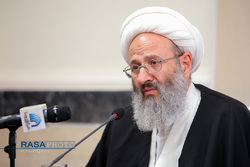 The renowned teacher of jurisprudence in the Islamic Seminary of Qom said, “Many scholars of jurisprudence didn’t achieve anything because they lacked piety but piety alone can’t be enough. For this reason, it’s necessary for the evolution of jurisprudence and ijtihad to include knowledge as well as piety.”
The renowned teacher of jurisprudence in the Islamic Seminary of Qom said, “Many scholars of jurisprudence didn’t achieve anything because they lacked piety but piety alone can’t be enough. For this reason, it’s necessary for the evolution of jurisprudence and ijtihad to include knowledge as well as piety.” RNA – In an exclusive interview with Rasa News Agency, Ayatollah Mohsen Faqihi, a member of the Society of Seminary Teachers of Qom, expressed his opinion on the situation of ethics in the Islamic Seminaries as religious scholars linked to the Islamic Seminaries have long had a fundamental approach to self-purification and the science of ethics. The teaching of Islamic ethics is an important pillar alongside learning religious rulings and theology.
In this regard, the head of the Dar al-Thaqalayn Wali al-Asr Institute said, “The issues of the Islamic Seminaries, the science of jurisprudence and ijtihad are different from other sciences. That that which is important in all sciences is that knowledge elevates a person and the one who is more knowledgeable becomes a specialist and can find a lofty position.”
Ayatollah Faqihi added, “But this is not the case in the science of jurisprudence and ijtihad – meaning that jurisprudence and ijtihad are based on science and piety. If one doesn’t have piety in physics, he can still become the best physicist and there is no need for piety but in jurisprudence, the person who has the highest level of piety, can reach a lofty level in jurisprudence.”
His Eminence said, “Many scholars of jurisprudence didn’t achieve anything because they lacked piety but piety alone can’t be enough. For this reason, it’s necessary for the evolution of jurisprudence and ijtihad to include knowledge as well as piety. If we find the most clergy-like individual who has no piety, his harm to Islam would be greater than that of others.”
Ayatollah Faqihi said, “These two wings must coordinate with each other in the Islamic Seminaries. Meaning the Islamic Seminaries must be strong in both knowledge and piety. The Islamic Seminaries must be strengthened alongside each other in this wing, namely, jurisprudence, the principles of jurisprudence, exegesis, biographical evaluation and other seminary sciences, must be strengthened but must be strengthened alongside lessons in ethics. However, that which is more important than lessons in ethics in the practice and implementation of these lessons in ethics.”
Rasa News Agency
112/977